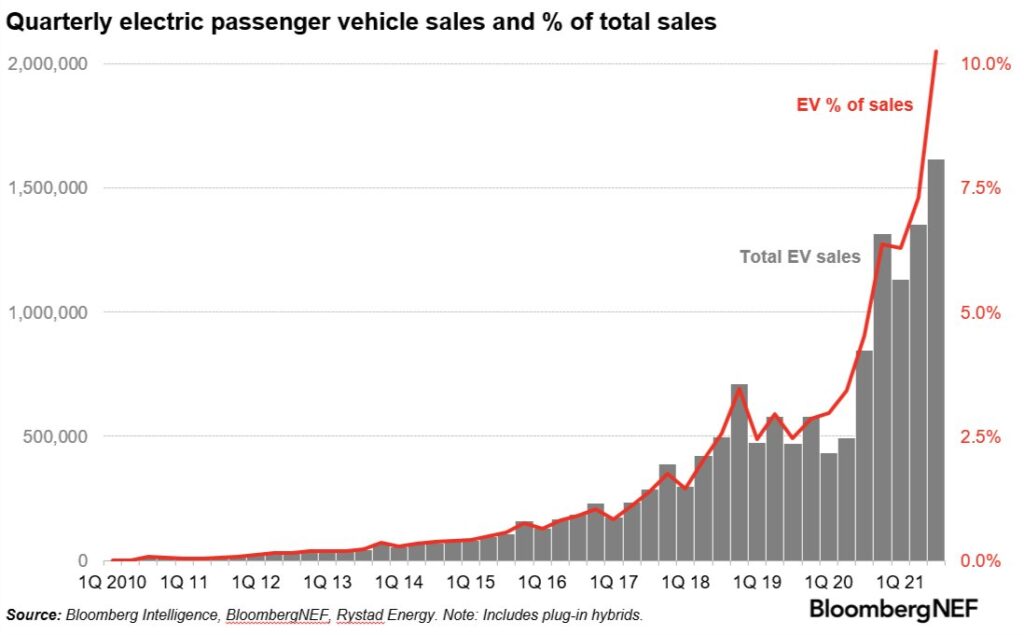New data from BNEF showed that passenger EVs had for the first time surpassed 10% of new auto sales across the world in Q1, 2021. The milestone sales figures come despite EVs having accounted for only 2.5% of the sales in Q1 2020, and most of the new cars sold this year have been fully-electric, not hybrids. In absolute figures, the number of EVs sold globally has now passed 2 million units.
Additionally, the average cost of li-ion batteries (spanning multiple end uses) has dropped by another 6% over 2020, to come down to $132/kWh. BNEF calculated that that was an 89% drop since 2010, even though the growing demand for li-ion batteries has inflated their prices by a certain percentage in the last two years.
FAME II supported 165,000 EVs & 2,877 charging stations, Himachal launches draft EV policy
India’s FAME II policy for the electrification of transport has supported the sales of 165,000 EVs between April 2019 – November 25 2021, India’s parliament was informed, and Rs. 528 crores of the subsidies available under the scheme were used to set up 2,877 charging stations across 25 states and 68 cities. The policy earmarked Rs. 10,000 crores as subsidies for EVs and has also made available 6,315 e-buses to a number of state/city transport fleets.
Additionally, the state of Himachal Pradesh approved its draft EV policy. Apart from the usual incentives, the state will aim to convert at least 15% of its transport fleet to fully-electric by 2025.
German coalition to phase out ICE cars before 2035, but keep sports cars and e-fuels
The coalition parties of the next German government decided to phase out the sales of new ICE cars well before the EU’s target of 2035, but with the caveat that high-end sports cars escape the ban. Also, the decision allows for the registration of vehicles that run on synthetic fuels outside of standard emissions rulebooks, as German engine manufacturers — a huge subsector of its automotive market — argue that it will help keep thousands of engine-related jobs alive. Synthetic fuels can also be dispensed from regular petrol and diesel stations, which fuel suppliers argue lends them well to be blended with existing fuels.
Yet, synthetic fuels — also called e-fuels — would likely retail at higher prices than regular gasoline and make EVs the more attractive option, unless their production can be ramped up significantly.
Nissan to double EV budget, to spend $13billion in developing new models
Japanese carmaker Nissan announced that it would double what it spent on EVs in the last decade and would up its budget to $13billion to speed up its transition to building only electric vehicles. It plans to develop 15 new, fully-electric models by 2030 and according to the CEO, the decision is partly influenced by the carmaker’s desire to meet societal needs and be cognisant of climate change. Additionally, Nissan is aiming to lower the aim of li-ion battery packs by up to 65% in the next eight years and aims to go carbon-neutral by 2050.
In contrast, the CEO of Toyota Motors was quoted in September as saying that the transition away from the IC engine would cost millions of jobs, and that “carbon dioxide was the enemy, not the internal combustion engine”. Yet, at the same time, the world’s largest automaker is aiming to produce mass-market, affordable EVs with a range between 250-300 miles per charge.
About The Author
You may also like
New report shows ways to build an efficient e-bus ecosystem in India
Corporate watchdog accuses Toyota of misleading marketing, greenwashing
Electrifying India’s Roads: Financing EVs – Challenges, Progress and the Road Ahead
Five lithium and cobalt mines identified in overseas exploration
India approves $7 billion plan for 10,000 electric buses in 169 cities in next 10 years


